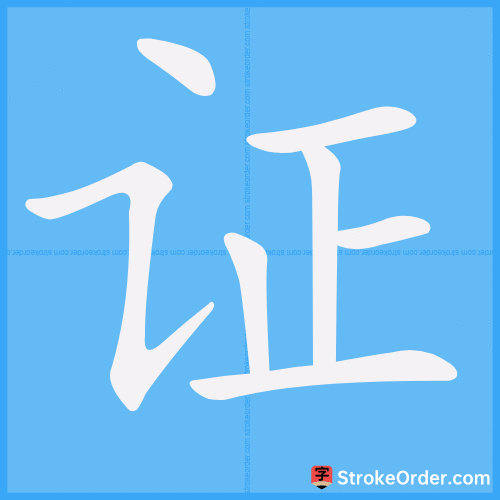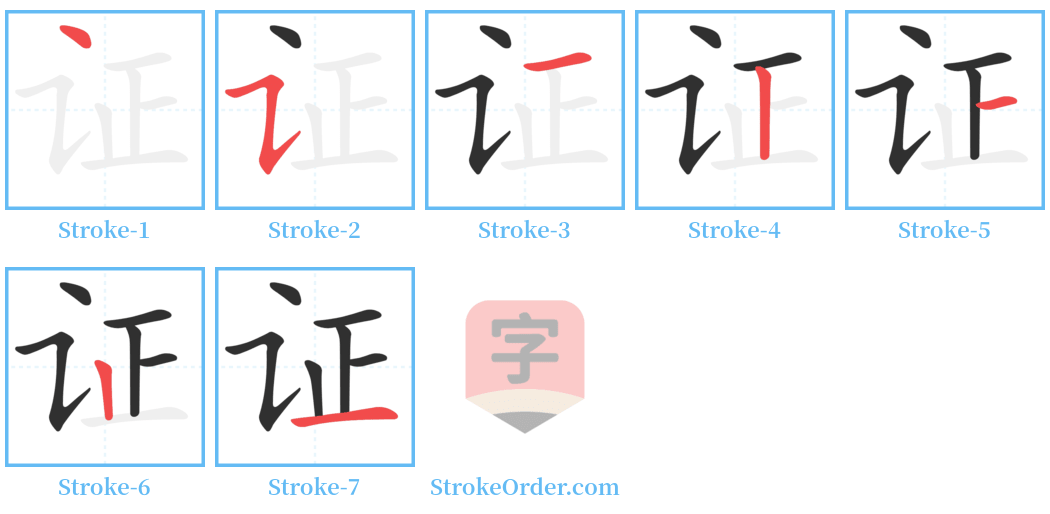证 Stroke Order
Animated Stroke Order of 证

Stroke Order Diagrams for 证

Step-by-Step Handwriting Guide for 证

Learn to Write Chinese Characters with Video Tutorials
Watch the video of writing the Chinese character "证", learn the correct stroke order (笔顺) of the character "证", and master the standard way of writing the character "证".
Free Printable Handwriting Practice with Stroke Order: 证
Printable Writing Practice Worksheet of "证" in Portrait Orientation (Tian Zi Ge)

Printable Writing Practice Worksheet of "证" in Landscape Orientation (Tian Zi Ge)

Information of 证
Pinyin
zhèng
Radical
讠
Strokes
7 strokes
Usage
★★★★★
Definition
prove, confirm, verify / proof, certificate / proof / to prove / to demonstrate / to confirm / certificate / proof
证
证 zhèng
Definitions:
1. To indicate or conclude using individuals or facts.
- Example usages: 证明 (prove), 保证 (guarantee), 证实 (verify), 作证 (testify), 对证 (cross-examine), 论证 (argue), 人证 (witness), 物证 (physical evidence).
2. Evidence; something that helps to determine matters.
- Example usages: 证据 (evidence), 凭证 (receipt), 证书 (certificate), 出入证 (entry/exit permit), 证章 (badge), 有诗为证 (there's a poem as evidence), 证券 (security).
证
证 zhèng
[Verb]
Meaning: To remonstrate.
引:
1. From 《说文》: 证, to remonstrate.
2. From 《战国策·齐策》: A soldier could remonstrate with Jing Guo Jun, but he did not listen.
例: Again: 证谏 (advice in frankness).
证
证 zhèng
[Noun]
1. Commonly used as 症. Disease and illness.
- 引: 1. From 清·黄宗羲's 《子刘子行状》: Then the master’s words were the medicine for the thoughts of Ling.
2. Abbreviated from 徵. Also used for evidence.
- 引: 1. From the translation of Huxley's work: Seeking evidence is not far-fetched.
证
证 zhèng
[Verb]
Meaning: To inform against.
本义: Report offenses.
造字法: The character is phonetic; comprises elements for speech (言) and correctness (正). The traditional form appears as “登” in tone.
1. Same original meaning (inform against).
- 引: 1. From 《说文》: 证, to inform against; composed of speech and an ascending tone.
- 2. From 《论语·子路》: When his father stole sheep, he informed on him.
例: For instance: 证父 (inform against one's father).
2. To remonstrate; to point out someone’s faults and suggest changes.
- 引: 1. From 《吕氏春秋·巫徒》: Those who are self-willed cannot be remonstrated against.
3. To verify or confirm.
- 引: 1. From 《楚辞·惜诵》: Hence it is verified and not distant.
- 2. From 《后汉书·缪肜传》: He alone verified his account.
- 3. From 清·黄宗羲's 《柳敬亭传》: Using ancient examples to verify contemporary matters.
例: For instance: 证占 (verify); 证验 (validate); 证类 (prove by analogy); 证审 (examine for verification); 证察 (investigate).
4. Buddhist terminology; to realize or attain understanding.
- 引: 1. From 唐·张鷟's 《朝野佥载》: The Zen master later attained enlightenment and resided in Linlu Mountain.
例: For instance: 证果 (attain the fruit of Dao); 证圣 (achieve holy fruit); 证悟 (realize through cultivation); 证业 (prove through realization of deeds).
证
证 zhèng
[Noun]
1. Evidence; proof; testimony.
- 引: 1. From 《大戴礼记·文王官人》: Be cautious with the use of six pieces of evidence.
- 2. From 《后汉书》: No evidence submitted, the trial cannot proceed.
例: For instance: 证明师 (a person or entity serving as evidence); 证左 (Those present witnessing the facts can provide proof of actual circumstances).
2. Certificate or identification.
- 例: For example: 工作证 (work permit); 身分证 (identity card); 出生证 (birth certificate); 健康证 (health certificate).
proof / certificate / identification / testimonial / CL:個|个[ge4] / to prove / to testify / to confirm the truth of
China Securities Regulatory Commission (CSRC) / abbr. for 中國證券監督管理委員會|中国证券监督管理委员会[Zhong1 guo2 Zheng4 quan4 Jian1 du1 Guan3 li3 Wei3 yuan2 hui4]
Input Method for 证
Pinyin
zheng4
Wubi
yghg
Cangjie
ivmym
Zhengma
saii
Four Corner
31711
Unicode
U+8bc1
Same Pronunciation Characters